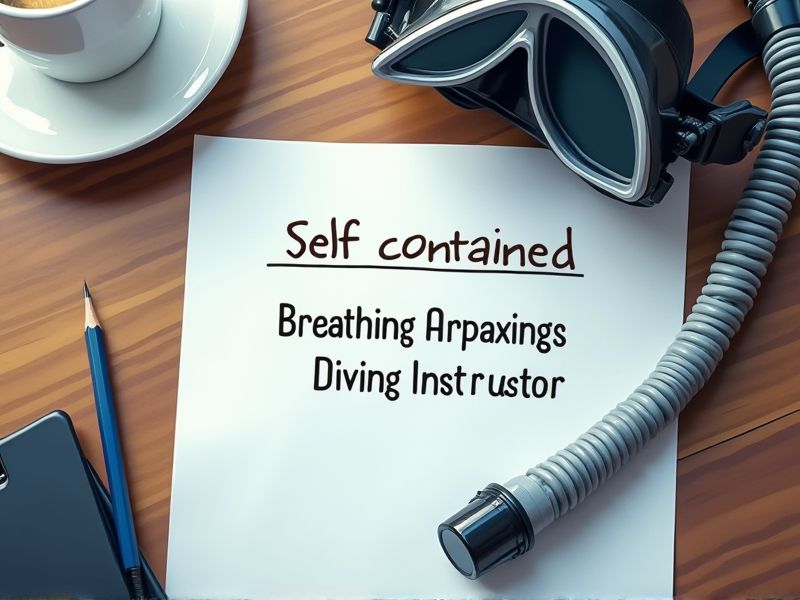
Becoming a self-contained underwater breathing apparatus (SCUBA) diving instructor requires specific certifications to ensure both the safety and competence of individuals leading underwater explorations. These certifications confirm that the instructor has a comprehensive understanding of dive theory, safety protocols, and emergency management. The need for such certifications stems from the inherent risks of diving environments, which demand a high level of skill and preparedness. Here are some important certifications you may need to become a SCUBA diving instructor.
Open Water Diver Certification
The Open Water Diver Certification ensures foundational safety skills essential for those aspiring to lead as diving instructors. Achieving this certification conveys a thorough understanding of scuba equipment, vital for instructing students. It establishes baseline competence in underwater navigation and environmental awareness, crucial for effective instruction. Possession of this certification indicates adherence to internationally recognized diving standards, enhancing overall trust in instructional capabilities.
Advanced Open Water Diver Certification
Achieving the Advanced Open Water Diver Certification enhances a diver's skills, enabling them to instruct others with greater expertise. The certification ensures that an instructor possesses comprehensive knowledge, especially in diverse underwater conditions and environments. This level of training improves safety for both the instructor and their students during SCUBA activities. Experienced divers with advanced certification can effectively teach complex diving techniques, which are crucial for the development of proficient divers.
Rescue Diver Certification
Acquiring the Rescue Diver Certification enhances an instructor's ability to foresee and manage underwater emergencies, ensuring the safety of both the instructor and students. Proficiency in rescue skills bolsters confidence and competence, leading to more effective teaching in high-pressure situations. The certification provides essential training in recognizing stress in divers, directly contributing to preventing accidents before they escalate. Comprehensive rescue knowledge establishes credibility and trust, essential for an instructor tasked with shaping competent and safe divers.
Divemaster Certification
The Divemaster Certification serves as a foundational step in becoming a certified diving instructor by ensuring individuals possess advanced diving skills and safety knowledge. It provides a structured pathway to develop leadership capabilities necessary for supervising, guiding, and instructing novice divers. Experience gained during the certification helps instructors effectively manage real-world diving scenarios, minimizing risks and enhancing safety for all participants. Establishing competence through this certification increases trust and credibility among potential students and employers in the diving industry.
Instructor Development Course (IDC) Certification
IDC certification is essential because it equips diving instructors with advanced skills necessary for teaching diverse courses. This certification ensures that instructors adhere to international safety standards, minimizing risks to student divers. It elevates an instructor's credentials, enhancing employability in competitive diving markets. IDC certification empowers instructors with up-to-date pedagogical techniques, leading to improved instructional quality and student outcomes.
Scuba Instructor Certification
Scuba Instructor Certification ensures that the instructor possesses the necessary expertise and knowledge to teach safe diving practices. Rigorous training and evaluation processes prepare instructors to handle various underwater scenarios, reducing the risk of accidents. Certification provides a standardized framework for teaching, ensuring consistency in diving instruction worldwide. It validates the instructor's capability to assess and respond to potential emergencies, thereby enhancing the safety of students.
CPR and First Aid Certification
CPR and First Aid Certification is essential for self-contained underwater breathing apparatus diving instructors due to the high-risk nature of diving, where emergencies can arise unexpectedly. Without proper training, an instructor may struggle to manage life-threatening situations, leading to decreased safety for divers. Certification ensures that instructors are equipped with the skills to appropriately respond to injuries or cardiac events underwater. Enhanced first aid knowledge boosts confidence in both instructors and students, promoting a safer diving environment.
Nitrox Diver Certification
Nitrox Diver Certification equips instructors to handle enriched air blends, which extend bottom times and reduce decompression requirements. Knowledge of nitrox improves safety when managing multiple divers using different gas mixtures underwater. Certification ensures instructors can effectively teach and supervise divers who choose enriched air for their dives. The ability to work with nitrox aligns instructors with industry standards and expectations, broadening their teaching scope and appeal.
Deep Diver Certification
Deep Diver Certification equips instructors with advanced skills to handle greater depths, ensuring safety in challenging underwater conditions. Instructors with this certification can teach a wider range of dive courses, increasing their expertise and value in the diving community. As depths increase, the complexities and risks also rise, necessitating specialized knowledge to manage potential hazards effectively. Certification enhances credibility and trust among students, who rely on instructors' proficiency to guide safe and rewarding diving experiences.
Emergency Oxygen Provider Certification
Certification for Emergency Oxygen Providers establishes critical skills in managing potential diving-related injuries, such as decompression sickness and hypoxia, enhancing safety for both instructors and students. When instructors are certified, response time to oxygen-dependent emergencies significantly decreases, reducing the risk of severe complications. Adhering to these safety protocols increases confidence and trust among divers, facilitating more effective learning environments. Certification aligns with international diving safety standards, ensuring compliance and minimizing legal risks associated with underwater instruction.
Summary
When you acquire additional certifications as a self-contained underwater breathing apparatus diving instructor, it broadens your professional skills and enhances your marketability. This diversification increases your potential to offer specialized courses, attracting more students eager for unique diving experiences. With advanced credentials, you may also command higher fees, directly impacting your earning potential. Professional development through certification fosters deeper knowledge, improving safety standards and teaching effectiveness, which elevates client satisfaction and trust.
